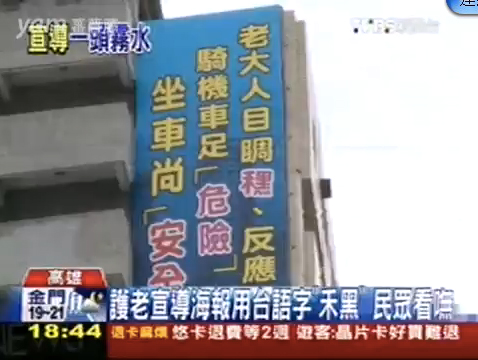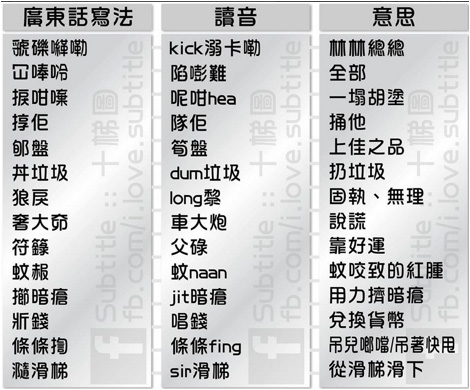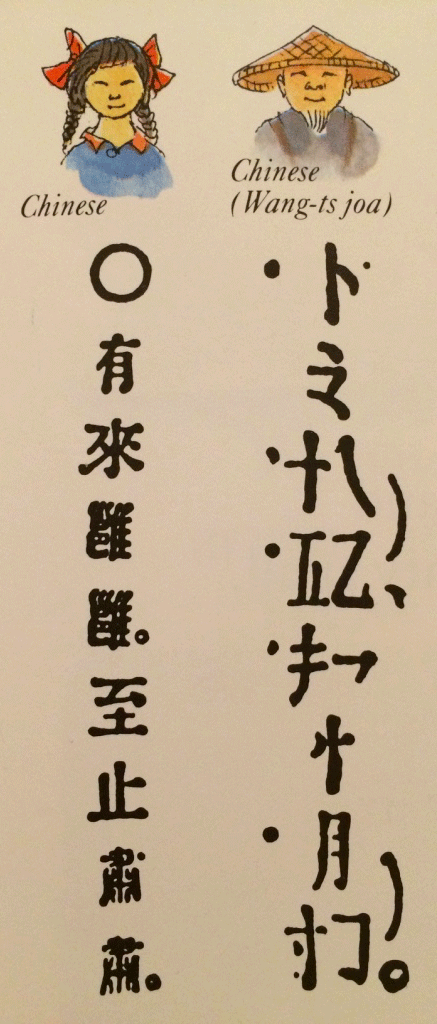Archive for Topolects
November 8, 2015 @ 9:40 pm· Filed by Victor Mair under Topolects, Words words words, Writing
[This is a guest post by Michael Cannings]
This brief news segment features a poster with a lot of interesting points packed into three short lines of text. The billboard is a traffic safety announcement by police in Kaohsiung, southern Taiwan.

[Screengrab with most of the text visible]
Read the rest of this entry »
Permalink
October 29, 2015 @ 6:00 am· Filed by Victor Mair under Language and culture, Topolects
Chuin-Wei Yap has an interesting article about the southern conurbation known as Chaoshan in China Real Time: "Underground Banks Trace Roots to the Sicily of China" (WSJ, 10/27/15).
Chaoshan is a portmanteau name composed of the first syllables of the two main cities that it encompasses: Chaozhou (Teochew) and Shantou (Swatow).
I have long been intrigued by Chaoshan because of its rich history and the abundance of outstanding people who came from this area, including Li Ka-shing (the richest man in Asia; b. July 29, 1928) and my old friend, Jao Tsung-I 饒宗頤 (b. August 9, 1917), whom I consider to be the greatest living Chinese scholar, with a phenomenal breadth of learning and talent, despite the fact that he is basically an autodidact. I am also partial to Chaozhou because it is the home of one of China's most distinguished operatic traditions and gongfu tea, about which I wrote this very long blog post.
Read the rest of this entry »
Permalink
October 28, 2015 @ 5:40 pm· Filed by Victor Mair under Signs, Topolects, Translation
Andrew Herron sent in this photograph taken on Hospital Road, Hong Kong Island:

Read the rest of this entry »
Permalink
October 15, 2015 @ 7:37 am· Filed by Victor Mair under Classification, Topolects
The first comment to my post on "Multilingual voting signs" (11/9/12) was by Alinear, who stated that cǐ chù 此處 ("this place") sounds like Cantonese to him. As a matter of fact, as reader ahkow pointed out in the second comment, cǐ chù 此處 ("this place") is simply the literary / classical Chinese way of writing "here". Both cǐ 此 ("this") and chù 處 ("place") occur on the oracle bones, so this means that they have been a part of Sinitic vocabulary since around 1200 BC. Where they might have come from before that time remains to be determined.
Read the rest of this entry »
Permalink
October 12, 2015 @ 7:40 am· Filed by Victor Mair under Language and education, Language preservation, Multilingualism, Topolects
Hakka (Kèjiā 客家 ["guest families"]) is the name of a Chinese ethnic group and their language. Their name refers to the fact that, although they came from the north centuries ago, they are now scattered in various locations throughout South China and, indeed, the world.
Although the Hakka amount to approximately only 4% of the total population of China, their influence on politics, the military, culture, and other spheres of life in the past two centuries has been disproportionately large
Read the rest of this entry »
Permalink
September 25, 2015 @ 4:01 pm· Filed by Victor Mair under Topolects, Writing
From Mengnan Zhang:
I found this very interesting image on Facebook. The three columns stand for how to write various terms in Cantonese, their pronunciation, and the meaning of the words listed. As a native speaker of Mandarin, I have no idea what these words are talking about even after reading the meaning of each. Linked back to what our professor had talked about in class, Cantonese is a language, which both script and speech have no correspondence with Mandarin at all.

Read the rest of this entry »
Permalink
September 10, 2015 @ 10:26 pm· Filed by Victor Mair under Lost in translation, Signs, Slang, Topolects
Sign outside an apartment in Taipei:

Posted on imgur by Jverne
Read the rest of this entry »
Permalink
September 8, 2015 @ 6:57 pm· Filed by Victor Mair under Errors, Language on the internets, Topolects, Transcription, Writing
Stephen Halsey, who is spending the year in Taiwan doing research, observed an interesting linguistic phenomenon that shows the predominance of sound over symbol, even in the writing of Chinese, where the symbols are complex and semantically "heavy" in comparison to phonetic scripts like the Roman alphabet or bopomofo / zhuyin fuhao (Mandarin phonetic symbols), where the symbols are simple and semantically "light".
Read the rest of this entry »
Permalink
August 20, 2015 @ 11:39 am· Filed by Victor Mair under Dialects, Language and the movies, Topolects, Transcription, Writing systems
Are some languages innately more difficult than others? In "Difficult languages" (1/2/10), Bill Poser addressed this question from various angles. I've heard it said that Georgian is incredibly difficult because it possesses an "impossible" verbal system, has ergativity and other features that make for "interesting" learning, and so forth. Yet, in comparison with some of the North Caucasian languages (whose relationship to K'art'velian [or South Caucasian], the language family to which Georgian belongs — along with Svan, Chan/Megrelian/Mingrelian/Laz, is perhaps more an areal phenomenon than a genetic relationship), it is relatively simple. The North Caucasian languages have an abundance of phonemes and an even more complex grammatical system. John Colarusso has written an excellent grammar of Kabardinian, which gives a good idea of the complexity of this Northwest Caucasian language.
Read the rest of this entry »
Permalink
August 6, 2015 @ 9:17 am· Filed by Victor Mair under Creoles and pidgins, Topolects
From the Hong Kong Free Press:
"Hong Kong Chinglish page wins the internet overnight" (8/8/15)
The article begins:
A Facebook page presenting Hong Kong news in “Chinglish” attracted more than 15,000 likes overnight.
Kongish Daily, the motto of which is “Hong Kong people speak Hong Kong English,” became an instant sensation in the SAR after it published a number of stories that only people fluent in Cantonese and English could understand.
Read the rest of this entry »
Permalink
July 31, 2015 @ 1:25 am· Filed by Victor Mair under Alphabets, Language reform, Topolects, Writing
K Chang asked:
Possible topic for Prof Mair: Any one know what is this "Wang ts Joa" writing system, allegedly a topolect writing system for Chinese?
Here's a specimen of the script in question, from imgur:

Read the rest of this entry »
Permalink
July 22, 2015 @ 9:50 am· Filed by Victor Mair under Dialects, Language and education, Language and politics, Topolects
On his blog, "Throwing Pebbles", the journalist Yuen Chan describes how hard it is nowadays to find a decent elementary school in Hong Kong that offers instruction in Cantonese, rather than in Mandarin:
"Mother-tongue Squeezed Out of the Chinese Classroom in Cantonese-speaking Hong Kong" (7/22/15)
This despite the fact that Cantonese is the mother tongue of around 90% of the population of Hong Kong.
Read the rest of this entry »
Permalink
June 29, 2015 @ 9:03 am· Filed by Victor Mair under Language and food, Language and science, Lost in translation, Names, Topolects
Jackie and Mimi, Toni Tan's daughters, spotted two interesting products at the Asian supermarket near their home.
Read the rest of this entry »
Permalink




